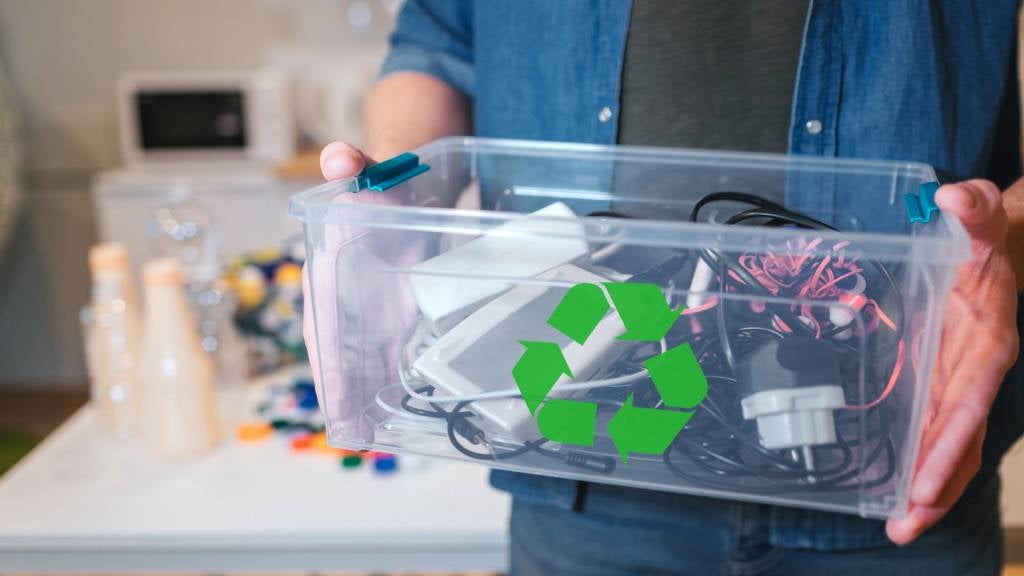Climate friendly ways to recycle old technology

With many of us upgrading to the latest shiny iPhone, laptop or flat screen TV every few years, what happens to our old technology? “The National Television and Computer Recycling Scheme (NTCRS) reports there is more than 100,000 tonnes of electronic products entering the country each year,” says Chris Tangey, General Manager, Ecycle Solutions. “If you include everything with a battery and a cord, the figure climbs to more than 500,000 tonnes. E-waste is the fastest growing waste stream, therefore it’s essential that Australia has a successful recycling program.”
Here are some ways to recycle or re-use your old tech in a more environmentally friendly way.
Recycle through accredited drop-off programs
Every year, Australians buy millions of new desktop computers, screens, laptops, printers, tablets and other products. But if your discarded technology then ends up in landfill, the materials used to make the products are wasted – including important non-renewable materials, including tin, nickel, zinc, and copper.
In response to Australia’s growing e-waste problem, the Australian Government set up the National Television and Computer Recycling Scheme (NTCRS). The scheme prevents old technology from being sent to landfill by providing the community with free recycling services. “E-waste can be responsibly and securely recycled into more than 90% of reusable components,” says Tangey. “It’s extremely easy for people to recycle their end-of-life products. With an extensive network of free drop-off locations nationally, there is usually somewhere close by to take their items. Make sure to recycle through reputable and responsible organisations that are accredited to AS5377 or the International standard – R2.” This holds your recycling provider to account, ensuring they meet a consistent standard of service and observe strong work health and safety requirements.
Many retailers have a free drop-off service at their stores, including Harvey Norman, The Good Guys, Betta Home Living, Bi-Rite and Officeworks. You can find your nearest ethical recycler by using Planet Ark’s Recycling Near You website. Simply choose the tech product you wish to recycle and enter your postcode to find your nearest drop-off point. Don’t worry, your data won’t find a second life. “All recyclers that are AS5377 accredited will ensure hard drives are data-wiped and shredded locally ensuring complete confidentiality of data stored within the end-of-life product,” says Tangey.
Donate to re-use
According to The Australian Mobile Telecommunications Association (AMTA), there are around 23 million unused mobile phones hidden in our drawers and cupboards across Australia. Old mobile phones, as well as discarded tablets, computers and laptops, can often be refurbished and donated to people who might not be able to afford a new version of the device.
Sydney IT worker Benjamin Millar started fixing unwanted tech during the 2021 Covid lockdowns, when he saw parents struggling with home-schooling technology requirements. “It’s a fairly simple idea: take old unwanted or broken computers and try to restore them back to a usable state, and then post them online to give away to folks who wouldn’t otherwise be able to afford the device,” explains Millar.
“The whole thing kicked off at the start of the 2021 lockdown when I grabbed four old laptops that my neighbour was going to send to e-waste. To my surprise, I was able to resurrect three of them. When I posted them on Facebook Marketplace, it soon became apparent there were a lot of people struggling with home-schooling because they were sharing a computer or didn’t have a computer at all, so I made a post asking the local community for broken/unwanted computers and it snowballed from there.”
Look for in-demand "old tech" items
Millar has since found that old tech is needed in many areas. “I’ve given machines to charities supporting teens in foster care to help with their studies, Indigenous Australians with disabilities, as well as for people affected by the recent floods, people fleeing an abusive relationship or people who need a computer for a training course to help them get back into the workforce. One young person who was hoping to study to be a game developer described the workstation I provided to him as ‘a shining light’. You’d be forgiven for thinking that a computer or internet access was ubiquitous in a city like Sydney, but it’s unfortunately not the case.”
Millar can be found through the Inner West Pay It Forward Facebook group, but he says there are lots of online community groups springing up around the country where people can donate old tech. “There are a lot of people like me who don’t want to throw out a device when they’ve upgraded to a new one, or have a broken device that isn’t worth paying someone else to fix,” he says. “There is satisfaction from seeing their devices getting a new lease of life and going to someone who really needs it, rather than going into landfill.”
Keen to donate your old tech? Millar has some tips: “The easiest stuff for me is devices that are still working and come with their power adapter (and/or peripherals), but even completely dead machines can be useful for parts. The stuff that garners the most responses when I post is usually Apple hardware – it’s shiny and people like them, but they’re also quite robust and well-designed.”
8 Aug 2022